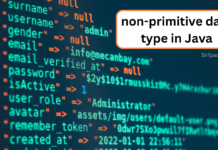Hello friends!
In today’s post, we will learn about the paradigm in java, in the explain post, what is it. How any programming language follows a paradigm. All programming languages follow some or the other paradigm. So today we will try to understand this paradigm.
Also Read:- What is Java
What is Paradigms in java
What are the programming paradigms in Java? Ever since software development began, there have been different approaches to designing programming languages. For each programming language, we have a set of concepts, principles, and rules. Such a set of concepts, principles, and rules is called a programming paradigm. In theory, languages are considered to be under only one paradigm, but in practice, programming paradigms are mostly combined into one language.
In the following section, we will highlight the programming paradigms on which the Java programming language is based, as well as the key concepts that describe these paradigms. These are imperative, object-oriented, declarative, and functional programming.
What is a programming paradigm?
So friends, first of all we know about the programming paradigm, what is the programming paradigm?
Friends, the programming paradigm is the basic system of computers. Because every programming language is based on some paradigm. Whether it is structural or procedural, every programming is based on some paradigm.
Every programming language has to use some programming paradigm approach or method. Every programming language has its own different nature or nature. This nature or nature of any programming is called a programming paradigm.
Each programming language has its own different way of working or solving a problem. Is. A programming language solves a problem in one way or another. So other programming languages solve the same problem in some other way.
The way of solving the problem of all these languages can call it a programming paradigm. Because programming paradigm tells the nature of programming language and how a programming language solves a problem. The programming paradigm tells us how any programming language solves or solves a problem.
How to use objects, variables, and methods in a program and how to do any work with these objects, variables, and methods also shows the programming paradigm. How the statement of the program will be arranged is part of the paradigm of any programming language.
In other words, a programming paradigm refers to some characteristics of a programming language. A programming paradigm does not make any programming, but the characteristics of a programming language define a programming paradigm.
Types of programming paradigm:-
So friends, now let us see the types or types of programming paradigms, how many types of programming paradigms are there?
Although there are many programming paradigms, we will read about the three most commonly used programming paradigms. Which programming paradigm is followed by some powerful languages like C, C++, Java, and Python. So this paradigm is as follows:-
- procedural programming paradigm.
- structural programming paradigm.
- OOP(object-oriented programming) paradigm.
What is the procedural programming paradigm:-
So friends, now we know about the procedural programming paradigm, what is it, and how it works.
A procedural programming paradigm is a programming approach that executes or executes code in a sequence to solve a problem. By the way, all programming approaches execute the code in a sequence. However in the procedural programming paradigm, importance is given to procedure rather than data.
The procedural programming paradigm is not about how to use and protect data, but rather how a procedure is supposed to perform a task. This means that full attention is given to designing the process. Not to make better use of data.
The procedural programming paradigm is a slightly better approach to the structured programming paradigm, which means that the shortcomings in structured programming have been removed in procedural programming. So we can say that the procedural programming paradigm is better than the structured programming paradigm.
The procedural programming paradigm is designed to address the shortcomings of the structured programming paradigm. Procedural programming can also be called another form of structured programming because both solve the problem in almost the same way but procedural programming solves the problem in a slightly different way.
What is the structured programming paradigm:-
So friends, now we know about the structured programming paradigm, what is it and how it works.
Data is not given much importance even in the structured programming paradigm. In this also the importance of work is how a structure module is working. It is also called a form of procedural programming because of giving more importance to the task. Just like having a function was important in procedural programming, similarly, having a function is also important in structured programming.
In this, a problem is solved in the form of a structure. This means that a big problem is solved by dividing the big problem into smaller sub-problems. Which there are different code blocks that focus on doing only one task.
Each structure or module performs its task in a sequential manner, each module has its own distinct function. Who fully concentrates on doing that work. These models do not mean who is accessing the data and what changes are being made to it. The module has nothing to do with anything other than its work.
Both these programming paradigms ignore data. Whereas data is the most important thing to do any work. Due to this in this programming approach, sometimes such problems arise due to which all the data is destroyed.
What is OPP(object-oriented programming) paradigm) :-
So friends, now we will learn about the OOP (object-oriented programming) paradigm, what is it and how it works.
OOP (object-oriented programming) paradigm is the most powerful programming approach in today’s time. Because in this, along with the data, attention is also paid to the process. In this programming paradigm, data is given so much importance that the data is kept completely secure, no class or function can access this data without permission.
The data is very secure in this programming approach. No unknown function or class can access any data. In this programming approach, we are able to keep the data completely secure. This approach is a bit more difficult than the other approaches. Because of this, it is difficult to know how the program will work from where. In this approach, a lot of work is done at run time. Which makes it more difficult.
This approach takes some of the characteristics of the other approaches. And it has its own characteristics that combine to make this approach a powerful approach.
So far, winning is also a programming approach, out of which it is considered to be the most powerful approach. The reason for this is that in this approach a problem is seen as an object and a class. This approach is able to solve real-life problems easily. In this approach, every problem is seen as an object or a class.
Object Oriented Programming paradigm is the most powerful approach today. But maybe a better programming approach will come in the future. Because the world of programming is developing day by day. In the coming time, a good programming approach can come from this programming approach, which will overcome the shortcomings of this approach.
Author:- So friends, now our post ends here. We hope that you must have liked our What is Paradigms in Java (programming paradigm) explaining OOP post. We have tried to explain the programming paradigm well in this post. If you think there is something missing in this post, then do let us know by commenting. We will try to fill that gap. Thanks for reading the post!









[…] Paradigms […]
I really liked your blog post.Really looking forward to read more. Cool.
thanks keep learning keep growing
thanks for learning